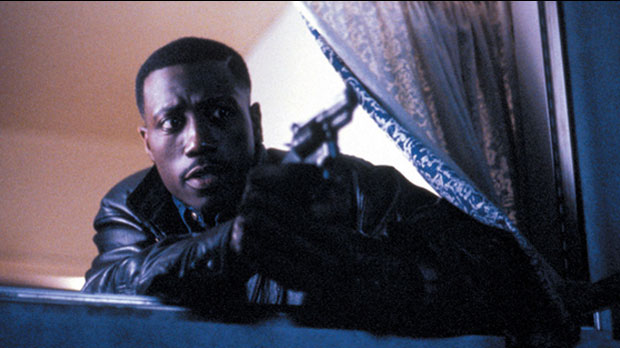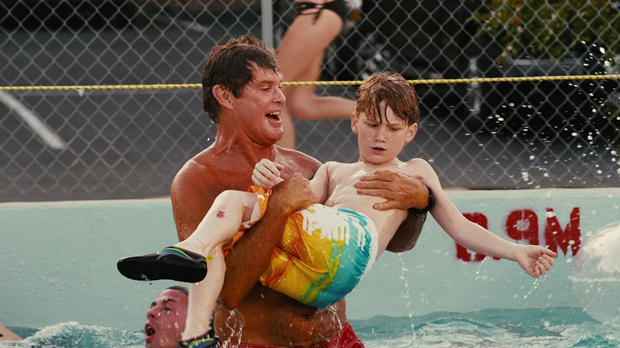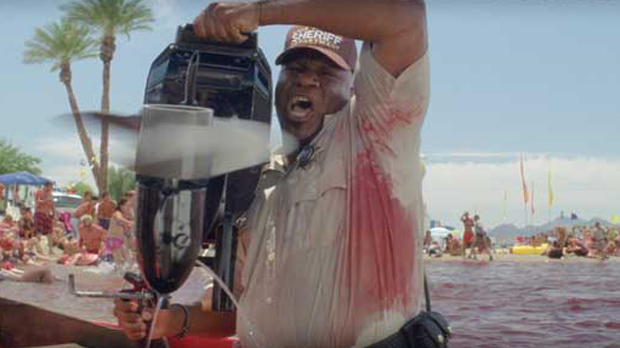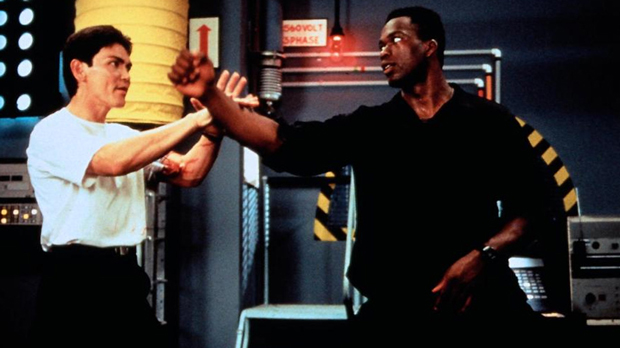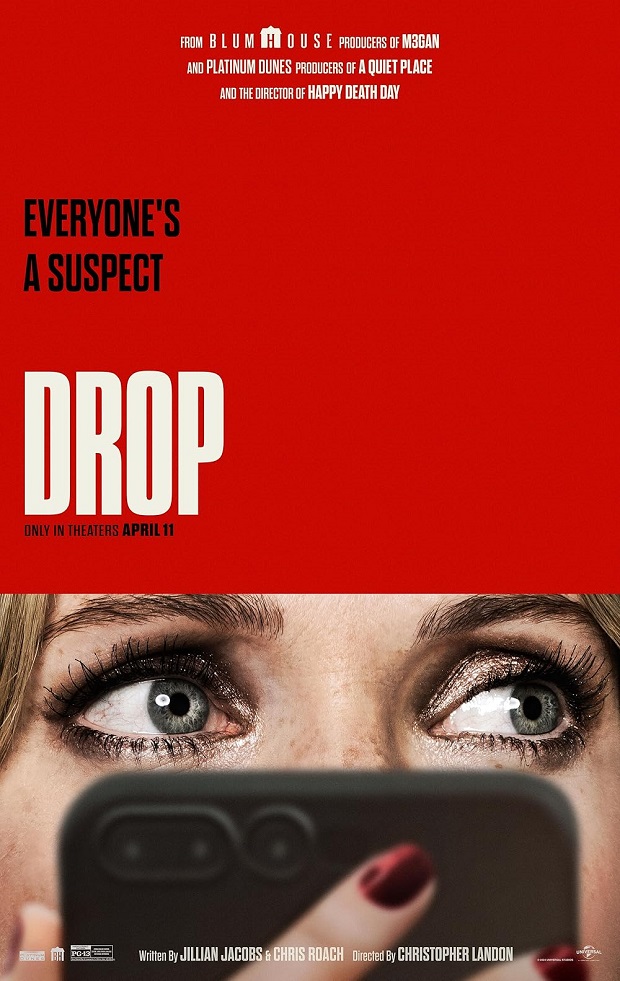 Boiling Point (1993) Warner Bros./Action-Thriller RT: 92 minutes Rated R (language, strong violence, sexuality, drug references) Director: James B. Harris Screenplay: James B. Harris Music: John D’Andrea and Cory Lerios Cinematography: King Baggot Release date: April 16, 1993 (US) Cast: Wesley Snipes, Dennis Hopper, Lolita Davidovich, Viggo Mortensen, Seymour Cassel, Jonathan Banks, Christine Elise, Tony Lo Bianco, Valerie Perrine, James Tolkan, Paul Gleason, Dan Hedaya, Lorraine Evanoff, Stephanie E. Williams, Tobin Bell, Bobby Hosea. Box Office: $10M (US)
Boiling Point (1993) Warner Bros./Action-Thriller RT: 92 minutes Rated R (language, strong violence, sexuality, drug references) Director: James B. Harris Screenplay: James B. Harris Music: John D’Andrea and Cory Lerios Cinematography: King Baggot Release date: April 16, 1993 (US) Cast: Wesley Snipes, Dennis Hopper, Lolita Davidovich, Viggo Mortensen, Seymour Cassel, Jonathan Banks, Christine Elise, Tony Lo Bianco, Valerie Perrine, James Tolkan, Paul Gleason, Dan Hedaya, Lorraine Evanoff, Stephanie E. Williams, Tobin Bell, Bobby Hosea. Box Office: $10M (US)
Rating: ***
Boiling Point, a noirish potboiler starring Wesley Snipes and Dennis Hopper, arrived in theaters without fanfare in spring ’93. The studio neither promoted it heavily nor screened it advance. It was marketed as a straight-up action movie in hopes that the same audiences that turned out for Passenger 57 (also starring Snipes) just five months earlier would show up for this one as well. They were understandably confused, and in some cases irate, when Boiling Point didn’t deliver exactly what they wanted. Instead of a kick-ass action flick filled with wild shoot-outs and high-speed car chases, it’s a stylish and subdued noir piece set in Los Angeles’ criminal underbelly.
I have to admit I hated Boiling Point at first look. I actually fell asleep on it. It was slow and poorly plotted with a choppy, disjointed narrative. The crowd that opening night grumbled and expressed their general dissatisfaction as they exited the theater, some louder than others. The movie tanked and disappeared quickly from theaters. Now just because I didn’t like Boiling Point doesn’t mean I forgot about it. I realized soon after that it’s one of those pictures that command a second viewing at some point. I rewatched it on cable TV about a year later and, lo and behold, liked it.
Snipes plays Jimmy Mercer, a US Treasury agent looking to avenge the murder of his colleague and best friend during an undercover operation at a motel. The lowlifes responsible for the cold-blooded killing are two-bit con man Red Diamond (Hopper, Blue Velvet) and dim-witted accomplice Ronnie (Mortensen, the LOTR trilogy). Red, who recently finished serving a five-year stretch in prison, has Ronnie convinced he’s a big time criminal with major connections which is true to some extent. He’s into mob boss Tony Dio (Lo Bianco, The French Connection) for $50,000. Now that he’s a free man, Tony is calling in the mark and gives Red just seven days to pay in full. It’s the same amount of time Jimmy has to track down his friend’s killers before being transferred to Newark, NJ as punishment for bungling the assignment. Red desperately scrambles to get the needed money with one failed scheme after another, not realizing that Jimmy is closing in on him. Also, unbeknownst to both men, they’re involved with the same woman, hooker with a heart of gold Vikki (Davidovich, Blaze).
Funny thing about Boiling Point, Jimmy crosses paths with Red several times during the course of the movie before realizing he’s the one he’s after. More than once, the two men are in the same place (hotel bathroom, burger stand) at the same time. Does this happen often in L.A.?
Boiling Point opens with an impressive aerial shot of the nighttime L.A. skyline. The camera pans past landmark buildings like the ARCO Company and Capitol Records while “Dream” (a beautiful, harmonic song sung by The Danny May Orchestra) plays over the soundtrack. It’s a perfect fit as the main characters all dream of better lives. Eventually the camera makes it to ground level where we see Red, sporting a vintage suit replete with wingtip shoes, walking confidently to a rendezvous with Ronnie. It’s the coolest opening I’ve seen since Sharky’s Machine. It perfectly sets the tone of the movie. The problems begin soon thereafter.
What happened is not the fault of writer-director James B. Harris (Cop) but the money-minded studio executives that edited it to strengthen Snipes’ role, hoping it would make Boiling Point more commercial. This accounts for the choppy narrative and underdeveloped characters, namely Red’s ex-wife Mona (Perrine, Superman I & II), a coffee shop waitress who’s none too happy to see the man that mistreated her. One suspects her role was originally bigger. I got the same feeling about Ronnie’s former girlfriend Carol (Elise, Child’s Play 2). She gets one major scene in which she explains the reasons for not wanting to resume the relationship. Ronnie slaps her on his way out and they start to kiss. That’s it expect for a brief, dialogue-free appearance in a later scene.
One gets the impression that Harris intended Boiling Point to be a different movie. A set of early scenes parallel the personal lives of Jimmy, Red and Ronnie and their failed marriages/relationships. This too gets dropped almost immediately to make room for more conventional police revenge thriller-type stuff.
The acting in Boiling Point is okay for the most part. Snipes delivers a comparatively low-energy performance as a T-Man with an attitude. Early on, his supervisor (Tolkan, Back to the Future) orders him to do things by the book in apprehending the bad guys. His response, “When I find this mother f***er, I’m gonna put him in a box …. by the book.”. The typically reliable Hopper is great as Red so named for his strawberry blonde hair. He’s a big talker who rarely factors his penchant for bad luck into his schemes. What’s interesting about this character is his distaste for violence and how easily he convinces his partner-in-crime to take care of such matters.
Mortensen turns in a decent early performance as the dim-witted sociopath that truly believes his mentor’s BS. Davidovich is good as Vikki, a character-type we’ve seen in countless other movies. She has a couple of great scenes opposite Hopper who hires her to join him for some swing dancing at a hotel ballroom. Seymour Cassel (The Killing of a Chinese Bookie) shows up as a dealer in counterfeit money who might have a clue who killed the agent at the motel. He’s one of the more interesting supporting characters in Boiling Point. Paul Gleason (The Breakfast Club) also shows up briefly as a courier for a sleazy lawyer. Dan Hedaya (Running Scared) plays Jimmy’s ill-fated partner.
It should be mentioned that the main crimes in the movie don’t involve drugs or illegal guns, but fake money (hence the novel’s title). While the nature of the motel operation is unclear, it somehow involves counterfeit money.
In the end, Boiling Point is a slick-looking neo-noir that makes up for in style what it lacks in substance. The cinematography, by King Baggot, is quite good. The movie primarily takes place at night, perfect for the shady goings-on. Although set in L.A., don’t expect a trip to the sunny side of the street. This L.A. is a world of glitz and sleaze. The score is terrific and perfectly apropos. The big band music provides a strong connection to the 40s which was a banner time for noir.
Some will argue Boiling Point is slow-moving. I counter by saying it’s a slow burn thriller. It has a few action scenes and one explosion, but that’s not really the point of the movie. It’s more about the seven-day time frame during which Red has to come up with 50 grand and Jimmy has to catch the bad guys before the clock runs out. There’s a fair amount of tension, just not enough to put you on the edge of your seat. It’s a good movie, not a great one. It’s a B-movie, not unlike many of the cheap film noirs that came out of Hollywood in the 40s and 50s. It’s definitely underrated and underappreciated.
TRIVIA TIDBIT: Boiling Point is based on the novel Money Men by Gerald Petievich who also wrote To Live and Die in L.A. Both movies feature the character of sleazy lawyer Max Waxman, played here by Jonathan Banks (Beverly Hills Cop). He was played by Christopher Allport (Dead & Buried) in the 1985 film.
